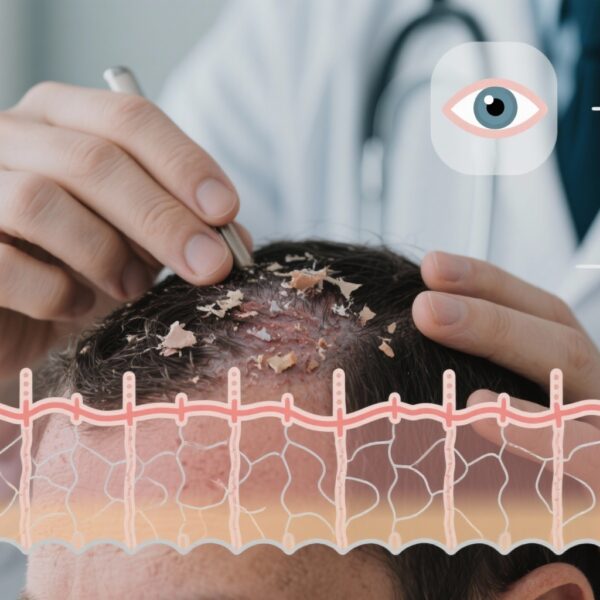Highlight
– In a French nationwide cohort of 36,129 adults initiating biologics for psoriasis, antibiotic exposure before or during follow-up was associated with a higher risk of discontinuing or switching the initial biologic (weighted HR 1.12; 95% CI 1.08–1.16).
– A dose–response effect was observed: patients with ≥2 antibiotic dispensations in a 6‑month window had a higher hazard of biologic discontinuation (weighted HR 1.29; 95% CI 1.24–1.35).
– These observational data support the hypothesis that antibiotics — potentially via gut microbiota perturbation — can reduce biologic persistence, but residual confounding prevents causal inference.
Background and clinical context
Psoriasis is a chronic immune-mediated skin disease affecting millions worldwide. Moderate to severe cases are frequently managed with systemic biologic therapies that target key immune mediators (eg, TNF, IL‑17, IL‑23). Biologic agents have transformed outcomes for many patients, yet clinical effectiveness and persistence (often described as “drug survival”) vary among individuals and tend to decline over time for a subgroup of patients. Understanding modifiable factors that influence persistence is clinically important because switching or discontinuing biologics is associated with symptom relapse, increased healthcare utilization, and additional costs.
One hypothesized modifier is the intestinal microbiota. Antibiotics produce marked, sometimes long-lasting shifts in gut microbial communities, which in turn can modulate systemic immune responses. Prior work in oncology and inflammatory diseases has shown that antibiotics may blunt responses to immune-targeted therapies, providing biologic plausibility for a similar effect in psoriasis.
Study design and methods
Ouakrat and colleagues performed a retrospective cohort analysis of the French National Health Insurance database spanning June 2011 to December 2022. The study included adults initiating a biologic for psoriasis, excluding those with preexisting inflammatory bowel disease at baseline. The primary outcome was discontinuation or switch of the initial biologic therapy.
Antibiotic exposure was classified at baseline as: none, 1 dispensation, or ≥2 dispensations in the 6 months before biologic initiation. During follow-up, antibiotic exposure was modeled as a time‑dependent variable using the same 6‑month windows. The authors used a weighted Cox marginal structural model (MSM) to account for time-dependent confounding and estimate adjusted hazard ratios (HRs) for the association between antibiotic exposure and biologic discontinuation/switch.
Key results
Population: 36,129 patients starting a biologic for psoriasis (mean age 48.4 ± 15.1 years; 42.0% female). Baseline antibiotic exposure (within 6 months prior to biologic initiation) was present in 9,366 patients (25.9%). During follow-up, 21,900 (60.6%) had at least one antibiotic dispensation. The most frequently prescribed antibiotic classes were β‑lactams, macrolides, and fluoroquinolones.
Main outcome: Antibiotic exposure (modeled time-dependently) was associated with a statistically significant higher risk of biologic discontinuation or switch. The primary adjusted estimate from the MSM was a weighted HR of 1.12 (95% CI 1.08–1.16) for any antibiotic exposure versus none.
Dose–response: The association was stronger with multiple dispensations. Patients with ≥2 dispensations in a 6‑month window had a weighted HR of 1.29 (95% CI 1.24–1.35) compared with no antibiotics, suggesting a dose‑response relationship between antibiotic burden and reduced biologic persistence.
Robustness: The large sample size, national claims coverage, and use of a marginal structural model to account for time-varying confounding strengthened the internal validity of the observed association. The analysis captured real-world prescribing patterns and was able to stratify exposure by number of dispensations and antibiotic classes.
Mechanistic plausibility: the gut–skin–immune axis
Several lines of evidence support a plausible mechanism linking antibiotics to reduced biologic persistence via the gut microbiome. Antibiotics can induce rapid and sometimes long-lasting shifts in intestinal microbial composition and function, reducing diversity and altering immunomodulatory taxa (Jernberg et al., ISME J 2007). Perturbations in the microbiome can influence systemic immune tone, mucosal barrier function, and cytokine networks relevant to psoriasis pathogenesis.
Analogous clinical observations exist in oncology, where pre‑treatment or early antibiotic exposure has been associated with lower efficacy of immune checkpoint inhibitors, consistent with a microbiome‑mediated effect on systemic antitumor immunity (Routy et al., Science 2018). While the immunologic mechanisms differ between cancer immunotherapy and psoriasis biologics, these data provide precedent that antibiotic-induced dysbiosis can modify responses to immune‑targeted therapies.
Clinical implications and practical considerations
For clinicians managing patients with psoriasis on biologic therapy, the study suggests several practice-relevant considerations:
- Antibiotic stewardship: Avoid unnecessary or empiric antibiotic prescriptions in patients receiving biologics, balancing the risks of undertreated bacterial infection against the potential impact on biologic persistence.
- Review necessity and timing: When antibiotics are indicated (eg, confirmed bacterial infections, perioperative prophylaxis), engage dermatology colleagues to discuss timing of biologic dosing relative to infection management and the potential need for temporary holding of therapy according to guideline-informed risk stratification.
- Patient counseling: Inform patients that repeated or recent antibiotic courses might be associated with higher likelihood of needing to change biologic therapy, while emphasizing that acute infections should still be treated appropriately.
- Monitor outcomes: Be alert for loss of response after antibiotic exposure and consider earlier assessment of disease control if symptoms worsen after antibiotic courses.
These are pragmatic suggestions grounded in observational data; they do not yet mandate changes to guideline-recommended practice but encourage heightened attention to antibiotic use in this population.
Limitations and alternative explanations
Although methodologically rigorous for an observational claims-based study, several limitations constrain causal inference:
- Residual confounding and indication bias: Antibiotic prescriptions often signify infections; infections themselves (or the conditions that predispose to infections) may lead clinicians to discontinue biologics temporarily or permanently. The MSM approach reduces but may not eliminate such confounding, especially for unmeasured factors (eg, psoriasis severity, adherence, lifestyle factors, over-the-counter medication use, microbiome baseline composition).
- Misclassification: Claims data capture dispensations but not actual ingestion, and they lack granular clinical data (physician rationale for discontinuation, psoriasis severity scores, microbiome measures, or laboratory markers of infection or inflammation).
- Heterogeneity of antibiotics and indications: Different antibiotic classes exert distinct effects on the microbiome; the study reports the most common classes but the analysis did not fully parse class-specific effects or indications for use (eg, dental prophylaxis vs respiratory infection).
- Generalisability: The cohort reflects the French healthcare system and prescribing patterns; results may differ in other healthcare settings or populations with different baseline microbiome compositions.
Research directions
This study raises actionable hypotheses to be tested prospectively:
- Prospective cohorts with integrated microbiome sampling (stool, skin), immune phenotyping, and clinical psoriasis outcomes before and after antibiotic exposure will help establish temporality and mechanism.
- Randomized trials are unlikely to justify withholding antibiotics, but pragmatic designs could test interventions such as targeted antibiotic stewardship, timing strategies for biologic dosing around infections, or microbiome-restorative adjuncts (eg, defined prebiotics/probiotics or fecal microbial transplantation in selected research settings).
- Mechanistic studies should examine whether antibiotic-associated loss of biologic response differs by biologic class (eg, anti‑TNF vs anti‑IL‑17 vs anti‑IL‑23) and whether specific taxa or microbial functions predict resilience or vulnerability to antibiotic perturbation.
Conclusion
The nationwide French cohort reported by Ouakrat et al. (JAMA Dermatol. 2025) found that antibiotic exposure — especially repeated dispensations — was associated with a modest but statistically significant increase in the risk of discontinuing or switching an initial biologic therapy for psoriasis. The findings are biologically plausible given known effects of antibiotics on the gut microbiome and precedent from other immune-targeted therapies, yet causal attribution is limited by the observational design and potential residual confounding.
Clinically, these results argue for cautious antibiotic prescribing and closer clinical surveillance after antibiotic courses in patients on biologics, while recognizing that appropriate treatment of bacterial infections remains paramount. Prospective, mechanistic, and interventional studies are needed to determine whether mitigating antibiotic-associated dysbiosis can preserve biologic effectiveness and improve long-term outcomes in psoriasis.
Funding and ClinicalTrials.gov
Funding and trial registration as reported by the original authors: see Ouakrat R, Penso L, Jullien D, Sokol H, Sbidian E. Antibiotic Use and the Persistence of Biologic Therapies in Patients With Psoriasis. JAMA Dermatol. 2025 Nov 12:e254427. doi: 10.1001/jamadermatol.2025.4427.
Selected references
Ouakrat R, Penso L, Jullien D, Sokol H, Sbidian E. Antibiotic Use and the Persistence of Biologic Therapies in Patients With Psoriasis. JAMA Dermatol. 2025 Nov 12:e254427. doi:10.1001/jamadermatol.2025.4427.
Routy B, Le Chatelier E, Derosa L, et al. Gut microbiome influences efficacy of PD‑1‑based immunotherapy against epithelial tumors. Science. 2018;359(6371):91-97.
Jernberg C, Löfmark S, Edlund C, Jansson JK. Long‑term ecological impacts of antibiotic administration on the human intestinal microbiota. ISME J. 2007;1(1):56-66.



